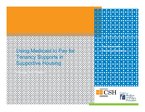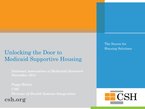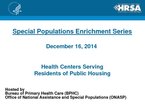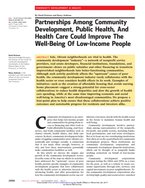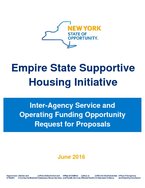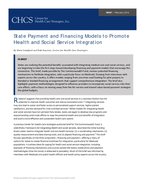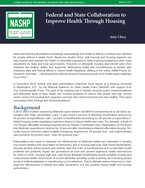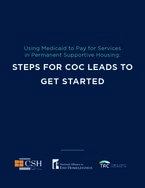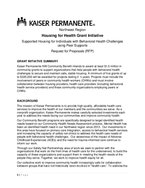Found 36 resources.
1
0
0
The Administration for Community Living’s Aging and Disability Network is a multifaceted service infrastructure for older adults and people with disabilities so they can find housing and obtain services like chore assistance, delivered meals, and transportation. By partnering with this community infrastructure, PHAs can improve voucher utilization and leverage and align resources so older adults, people with disabilities, and people experiencing homelessness —all priority populations for federal housing assistance—can obtain supportive services needed to attain housing stability, optimize...
Topics: Advocacy, Community development, Disabilities, Health, Housing, Partnerships, Research, Seniors, Supportive housing, Sustainability
 Shared by Karina George
on Jun 17, 2022
Shared by Karina George
on Jun 17, 2022 0
0
0
The Low Income Investment Fund (LIIF) will moderate a unique cross-sector panel of housing and early care and education (ECE) experts on strategies and best practices for co-locating ECE facilities within affordable housing developments. Discussion of specific financing techniques and site design considerations from existing co-located facilities will provide attendees lessons on policy and programmatic changes needed to incentivize co-location. Panelists include innovators in affordable housing development, government and public sectors, early care and education operations, and community...
Topics: Advocacy, Broadband, Child welfare, CLPHA, Family engagement, Food insecurity, Health, Housing, Legislation & Policy, Low-income, Nutrition, School-readiness, Supportive housing, Sustainability
 Shared by Karina George
on Jun 17, 2022
Shared by Karina George
on Jun 17, 2022 0
0
0
In March 2020, the COVID-19 pandemic forced many public housing authorities (PHAs) to quickly adjust their operational procedures to protect their staff while providing emergency assistance to residents. Many PHAs had to close their offices and convert to remote operations almost overnight, while staff focused on supporting their tenants by delivering them food, doing wellness checks for vulnerable residents, and ensuring they had access to and in some cases providing the technology needed for children to attend school remotely and isolated residents to remain connected to friends, family,...
Topics: Advocacy, COVID-19, Data sharing, Health, Housing, Safety, Supportive housing
 Shared by Housing Is
on May 25, 2021
Shared by Housing Is
on May 25, 2021 0
0
0
The role of public and nonprofit hospitals and hospital systems in supportive housing is not an obvious one at first glance. Traditionally, the role of nonprofit and public hospitals has been to provide primary healthcare and additional health services to the public, often to select “catchment” areas or neighborhoods. The extent of these institutions’ role in housing was limited to either providing a) short-term inpatient beds for medical or treatment services, or b) residences for nurses or other hospital staff. Why then are more and more nonprofit and public hospitals becoming involved in...
Topics: Health, Homelessness, Housing, Partnerships, Research, Supportive housing
 Shared by Housing Is
on Apr 17, 2019
Shared by Housing Is
on Apr 17, 2019 0
0
0
The Housing and Medicaid Services Pilot Program in Indianapolis, also known as the Blue Triangle Housing Program, is a collaboration that includes Anthem, the City of Indianapolis, a non-profit housing organization, and a community mental health center (CMHC).
Topics: Health, Housing, Medicaid / Medicare, Midwest, Partnerships, Supportive housing
 Shared by Housing Is
on Apr 4, 2019
Shared by Housing Is
on Apr 4, 2019 0
0
0
A new collaboration of San Francisco Bay Area foundations and businesses is raising $540 million to tackle the region’s affordable housing crisis.
Topics: Community development, Health, Housing, Low-income, Partnerships, Supportive housing, West Coast
 Shared by Housing Is
on Jan 28, 2019
Shared by Housing Is
on Jan 28, 2019 0
0
0
To explore the benefits and challenges of rapid re-housing support services, How Housing Matters asked a group of experts to weigh in. Contributing to the discussion are Kathryn Monet, chief executive officer at the National Coalition for Homeless Veterans, Jacob Donnelly, director of supportive services at Swords to Plowshares, and Samantha Batko, research associate at the Urban Institute.
Topics: Asset building, Health, Homelessness, Housing, Low-income, Supportive housing, Workforce development
 Shared by Housing Is
on Jan 24, 2019
Shared by Housing Is
on Jan 24, 2019 0
0
0
For providers in the Supportive Housing arena, it is no secret that the road to recovery begins with housing. However, this fact has not always been recognized by major healthcare entities, like Medicaid. Thankfully, this mindset is changing and Supportive Housing organizations now have the ability to cover many of their services via Medicaid. Since the rules and requirements vary tremendously state-to-state, many providers feel overwhelmed with the documentation required to bill Medicaid.
During this session, Foothold Technology and experts from various states across the country,...
Topics: Affordable Care Act, Dual-eligibles, Health, Low-income, Medicaid / Medicare, Supportive housing
0
0
0
The Colorado Coalition for the Homeless (CCH) has been investing in supportive housing since 1990. Since that time, this comprehensive community health center has developed nearly 1,700 units of housing, and is one of the country’s leaders in integrating health care and housing for a vulnerable population.
This webinar discusses how CCH finances its capital development; how they plan, design, and manage multiple projects simultaneously; how they integrate housing and health care services; and how they include property management staff in a coordinated approach to care. This conversation...
Topics: Health, Homelessness, Low-income, Medicaid / Medicare, Mental health, Pacific Northwest, Place-based, Supportive housing
0
0
0
Partnerships between medicaid and supportive housing providers
Topics: Cost effectiveness, Funding, Health, Legislation & Policy, Low-income, Medicaid / Medicare, Partnerships, Supportive housing
 Shared by Housing Is
on Aug 9, 2018
Shared by Housing Is
on Aug 9, 2018 0
0
0
Introduction to supportive housing and notes from the field
Topics: Health, Housing, Low-income, Medicaid / Medicare, Mental health, Partnerships, Supportive housing
 Shared by Housing Is
on Aug 9, 2018
Shared by Housing Is
on Aug 9, 2018 0
0
0
The Colorado Coalition for the Homeless created the Denver Housing First Collaborative (DHFC) in 2003 with funding provided by a collaboration of federal agencies. The DHFC involved CCH as the lead agency, Denver Department of Human Services (DDHS), Denver Health (DHHA), Arapahoe House, the Mental Health Center of Denver (MHCD) and the Denver VA Medical Center. The DHFC is designed to provide comprehensive housing and supportive services to chronically homeless individuals with disabilities. Initial federal funding created the capacity to house and serve 100 chronically homeless individuals...
Topics: Cost effectiveness, Funding, Health, Homelessness, Housing, Pacific Northwest, Partnerships, Research, Stability, Supportive housing
 Shared by Housing Is
on Aug 9, 2018
Shared by Housing Is
on Aug 9, 2018 0
0
0
Everyone needs safe, decent, stable housing. For some of the most vulnerable people in America — people with mental illness, chronic health conditions, histories of trauma, and other struggles — a home helps them to get adequate treatment and start on the path toward recovery. But some conditions make it difficult for people to maintain a stable home without additional help. Supportive housing, a highly effective strategy that combines affordable housing with intensive coordinated services, can provide that needed assistance.
Topics: Cost effectiveness, Disabilities, Health, Homelessness, Housing, Low-income, Medicaid / Medicare, Mental health, Place-based, Seniors, Supportive housing
 Shared by Housing Is
on Aug 9, 2018
Shared by Housing Is
on Aug 9, 2018 0
0
0
Social determinants of health are the economic and social conditions that affect health outcomes and are the underlying, contributing factors of health inequities. Examples include housing, educational attainment, employment and the environment.
Topics: Affordable Care Act, Disabilities, Health, Homelessness, Housing, Low-income, Medicaid / Medicare, Mental health, Partnerships, Place-based, Substance abuse, Supportive housing
 Shared by Housing Is
on Aug 9, 2018
Shared by Housing Is
on Aug 9, 2018 0
0
0
We sought to learn more about how state- and locally funded rental
assistance programs were created, how they are structured, whom they serve, and how they are funded.
Topics: Cost effectiveness, Data sharing, Disabilities, Family engagement, Funding, Health, Homelessness, Housing, Legislation & Policy, Low-income, Partnerships, Research, Supportive housing
 Shared by Housing Is
on Aug 1, 2018
Shared by Housing Is
on Aug 1, 2018 0
0
0
Anthem’s affiliated health plans and other managed care organizations (MCOs) increasingly are helping Medicaid members who are diagnosed with mental health conditions and substance use disorders (MH/SUD) find stable housing, secure meaningful employment, and address a range of financial and daily life challenges.
Topics: Affordable Care Act, Cost effectiveness, Depression, Funding, Health, Housing, Medicaid / Medicare, Mental health, Nutrition, Substance abuse, Supportive housing, Workforce development
 Shared by Housing Is
on Jul 27, 2018
Shared by Housing Is
on Jul 27, 2018 0
0
0
Topics: Asthma, East Coast, Health, Healthy homes, Housing, Low-income, Partnerships, Supportive housing
 Shared by Housing Is
on Jul 27, 2018
Shared by Housing Is
on Jul 27, 2018 0
0
0
On January 1, 2014, in states that have chosen to expand Medicaid eligibility under the Affordable Care Act, nearly all chronically homeless people who lacked health insurance became eligible for Medicaid. This Primer offers state Medicaid officials and other interested parties strategies for using Medicaid to meet the needs of this very vulnerable population--some strategies that have succeeded in the past and some that are emerging under provisions of the Affordable Care Act.
Topics: Affordable Care Act, Criminal justice, Disabilities, Dual-eligibles, Funding, Health, Homelessness, Housing, Low-income, Medicaid / Medicare, Mental health, Partnerships, Stability, Substance abuse, Supportive housing
 Shared by Housing Is
on Jul 27, 2018
Shared by Housing Is
on Jul 27, 2018 0
0
0
The community development “industry”—a network of nonprofit service providers, real estate developers, financial institutions, foundations, and government—draws on public subsidies and other financing to transform impoverished neighborhoods into better-functioning communities. Although such activity positively affects the “upstream” causes of poor health, the community development industry rarely collaborates with the health sector or even considers health effects in its work. We propose a four-point plan to help ensure that existing and future collaborations achieve positive outcomes and...
Topics: Community development, Food insecurity, Funding, Health, Low-income, Partnerships, Supportive housing, Transportation
 Shared by Housing Is
on Jul 24, 2018
Shared by Housing Is
on Jul 24, 2018 0
0
0
Time and again, taking a narrow view of health care has proven ineffective in producing meaningful change. Yet the current
thrust of health care reform remains firmly focused on traditional health care services. Reforms such as care coordination models and patient centered medical homes are necessary but insufficient for homeless populations with complex problems. Pairing such reforms with supportive housing is more likely to result in lasting health improvements and reduced costs.
Topics: Cost effectiveness, East Coast, Health, Homelessness, Housing, Legislation & Policy, Medicaid / Medicare, Place-based, Supportive housing
 Shared by Housing Is
on Jul 23, 2018
Shared by Housing Is
on Jul 23, 2018 0
0
0
States are realizing the potential benefits associated with integrating medical care and social services, and are beginning to take the first steps toward developing financing and payment models that encourage this connection. This brief, made possible by The Commonwealth Fund, reviews potential financing mechanisms to facilitate integration, with a particular focus on Medicaid. Drawing from interviews with experts across the country, it offers models ranging from one time seed funding for pilot projects to blended or braided financing arrangements that support comprehensive integration. The...
Topics: Cost effectiveness, Funding, Health, Medicaid / Medicare, Partnerships, Supportive housing
 Shared by Housing Is
on Jul 23, 2018
Shared by Housing Is
on Jul 23, 2018 0
0
0
This issue brief outlines ways in which Medicaid can support integrated strategies and, based on telephone interviews with key informants, profiles three current initiatives that illustrate distinctly different approaches to linking Medicaid and supportive housing. The three initiatives include one launched by a city (Philadelphia), one by a state (Louisiana), and one by a Medicaid MCO (Mercy Maricopa Integrated Care in Phoenix, Arizona). They target special populations including homeless individuals, people with a wide range of disabilities, and adults with mental health and/or substance use...
Topics: Cost effectiveness, Health, Homelessness, Housing, Low-income, Medicaid / Medicare, Supportive housing
 Shared by Housing Is
on Jul 20, 2018
Shared by Housing Is
on Jul 20, 2018 0
0
0
In December 2016, federal and state policymakers examined health and housing issues at a meeting convened in Washington, D.C., by the National Academy for State Health Policy (NASHP) with support from The Commonwealth Fund. The goal of the meeting was to identify concrete policy recommendations and actionable steps to align health and housing programs to ensure that people with high service needs receive the housing and supportive services they need to become and stay healthy. This report summarizes their findings and recommendations
Topics: Data sharing, Disabilities, Health, Homelessness, Legislation & Policy, Low-income, Medicaid / Medicare, Partnerships, Supportive housing
 Shared by Housing Is
on Jul 19, 2018
Shared by Housing Is
on Jul 19, 2018 0
0
0
This guide is organized around five steps, each of which includes concrete ways to get started as well as links to additional resources. These five steps will help you build a case for why and how Medicaid can be structured at the state and local levels to pay for services in permanent supportive housing. When building a case you need to know some basics of Medicaid and the types of services you want Medicaid to cover. in order to convince Medicaid administrators and other health care payers to support your efforts, you need to have evidence of need for and impact of supportive housing and...
Topics: Affordable Care Act, Data sharing, Funding, Health, Homelessness, Medicaid / Medicare, Partnerships, Supportive housing
 Shared by Housing Is
on Jul 13, 2018
Shared by Housing Is
on Jul 13, 2018 0
0
0
This paper offers strategic guidance in building, assessing and/or strengthening various types of partnerships between Health Center Program Grantees, behavioral health providers and supportive housing providers. Whether you represent one of these types of organizations or you are merely curious about health and housing partnerships, you can use this guide as your roadmap.
Topics: Data sharing, Dual-eligibles, Health, Low-income, Medicaid / Medicare, Partnerships, Supportive housing
 Shared by Housing Is
on Jul 13, 2018
Shared by Housing Is
on Jul 13, 2018 
